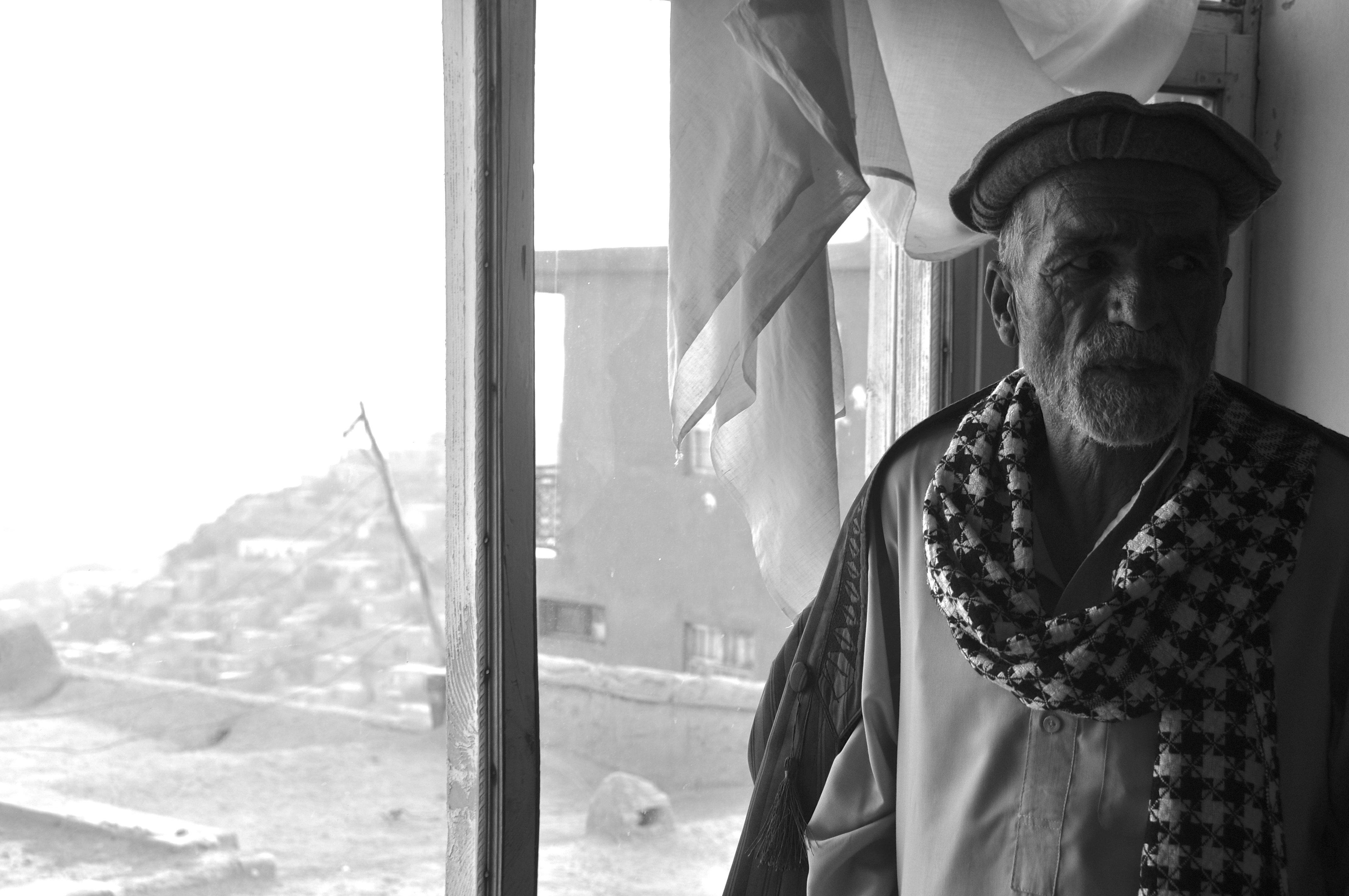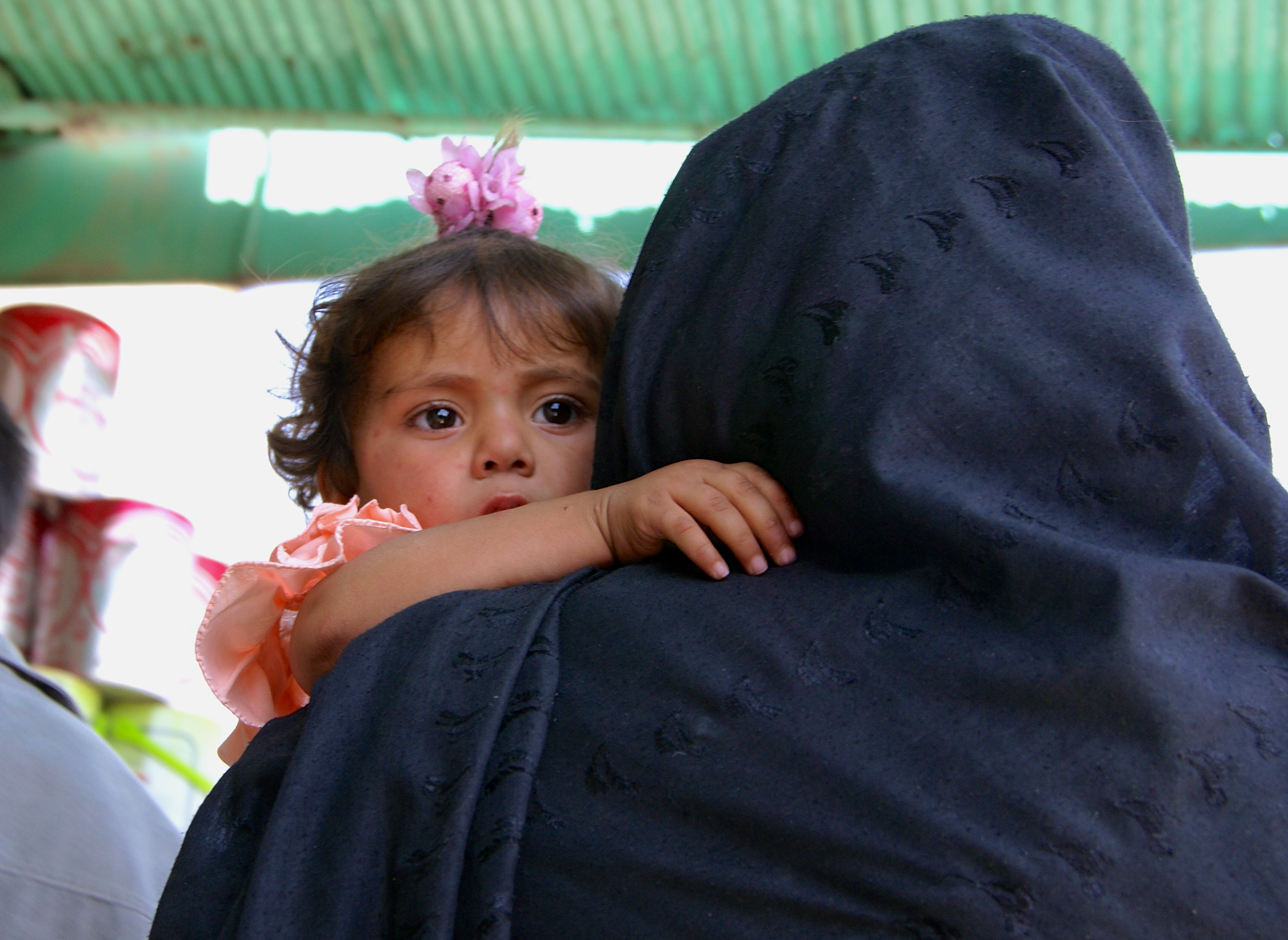
Name: Wakil Abdul Rahim
Age: 65
Ethnicity: Tajik
Province: Panjshir
The mountainsides that surround Kabul are covered with squatter houses, the homes of people who have claimed the land by building on it. They're undeterred by the steep grade; from below, many homes appear to be affixed to nearly vertical mountain faces. Many of the highest houses are inaccessible by car, but to get close you take narrow roads quickly, speeding so you don't stall or lose traction. The steeper and wilder the terrain, the faster you go.
We arrive at the home of Wakil Abdul Rahim and find him welcoming, but formal and severe. He quickly reveals himself to be the most pessimistic person I've spoken to about the withdrawal of U.S. and international forces, though he is also animated by a hatred for the people in power. It's as if he lives up here simply because it's as far away from them as he can get. He ushers us into a living room, serves us juice and cookies, and begins to explain what the international presence has looked like from all the way up here.
The following are the words of Wakil Abdul Rahim, as told to Jeffrey E. Stern and translated by Farima Abrar.
The government hasn't done anything for us up here on the mountains.
I moved up here forty years ago, and back then, there were only four or five houses here. From the bottom of the mountain to up here, there were no houses. But after we were here for a while, slowly people started building more and more.
I could buy a house anywhere in Kabul, but I liked the view up here. But not all people who are living on the mountain are rich people, they're poor people who cannot afford houses down in Kabul. People who are living here on the hills are those who fled the rural areas, places like Panjsher, because those areas were hit by violence, in fighting between the Soviet troops and mujaheddin.
People came to Kabul and left everything behind, so they couldn't afford living in flat areas. They started building huts on the mountains. At night they would build, but during the day, the huts were destroyed by the government because building houses in that area was illegal. So they would put their women and children inside the house so that the government wouldn't destroy them. And sometimes they would build and work on their houses during the day, and then at night, they would sit on top of the roof so that no one else would come and take the land, or destroy the house. They would sit all night on the construction.
I didn't buy this land, but I became the owner because whoever builds a house owns the land. All the mountains are the same that way. Now our government does not have the power to come and tell us anything. Why would they? They themselves came and took so much land! They're all corrupt, so what could they say to us when the government are the worst land grabbers of all?
It's different here than in the U.S. or in Germany, because there, the houses up high are more expensive than the houses down below. But here, most people do not really want to live on the mountains. The facilities on the mountains are very little. It's far from the city, and we have nothing, we didn't even have water. Whatever we need, we have to walk all the way down. Everyone used to go to collect water from the bottom of the mountain, carrying the water on sticks with buckets on each side. And our women — you would see 50 or 60 women walking up the mountain carrying water on their heads.
Now at least we have water, but not because of the government; the government did not do anything. There is a company that came and collected from each house 20,000 Afghani (approximately $360) and then they put pipes in. But they made so much money off of us, because now there are so many houses up here, and the company took money from each of us before they brought us water. And recently we got electricity. Not all the time, but sometimes we have it.
I used to have cows and sheep and horses up here too. Only recently I sent them back to Panjshir. We used to get grass and feed for them from down below. But now it's costly to get grass and feed for them, so I was not able to keep them here. Four or five years ago, it was cheap. But because of insecurity — Talibs are attacking on one side, the government itself is like a robber on one side, and the conflict between Pakistan and Afghanistan is on one side — it became more expensive. Before Karzai came, things were cheaper.
Our government is weak; these problems have nothing to do with Americans. Americans helped us, Germans also helped us, but all the benefits went to Karzai. It's not your problem as Americans, or Germans, or everyone else, it's our own government's problems. If you travel to Shamali in the evening, there will be robbers and people who attack you, it's not secure at all.
I don't see any change, the international presence didn't impact our lives, their money went to the pockets of the thieves like Ustad Sayyaf, Vice President Khalili, General Fahim.
Any high-rise building you see down there, it belongs to those corrupt people. Even the changes that you see up here on the hills, they are just for individuals who are linked with someone in the government. The people who go at 9 a.m. to their office and by 1 p.m. they will be in their house relaxing, they do nothing for the country. These people don't work for the betterment of our country, they just work for themselves.
I challenge you that the next time you come to Afghanistan, see what the situation will be. It will not be the same. The situation will be bad, and once the international forces leave, it will be just like it was in the past. Next year, I'm thinking of leaving Afghanistan. In one year, Afghanistan will be like the 1990s.
I think Karzai himself is like Taliban. I think he is supporting them. After the international community leaves Afghanistan, I think Karzai will give our country to Taliban people. He will divide our country into two parts, Pashtuns and Tajiks, and everyone else. The places where Pashtuns live, those areas will be Talib area.
One hundred percent I'm sure that in our future, the situation will be worse than what we had in the past. The suicide bombers, every day we can see the explosions. These things make us think that our life in the future won't be better than the past. Because the government can't do anything. And the only reason now we have a better life is because international forces are here. At least our government during Russian times, and Taliban times, was stronger. In these periods of conflict, the thing that worried me was a lot of people escaping to other countries, or other parts of this country. That's how you know how tense people are: people moving because they think the situation will get worse. And I'm seeing people leaving again.





